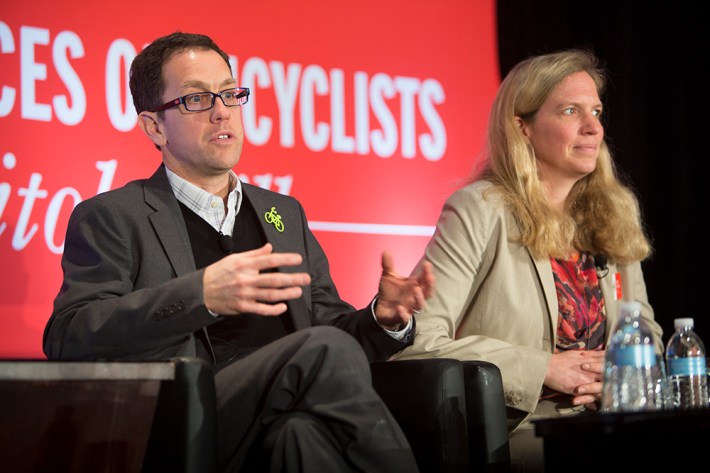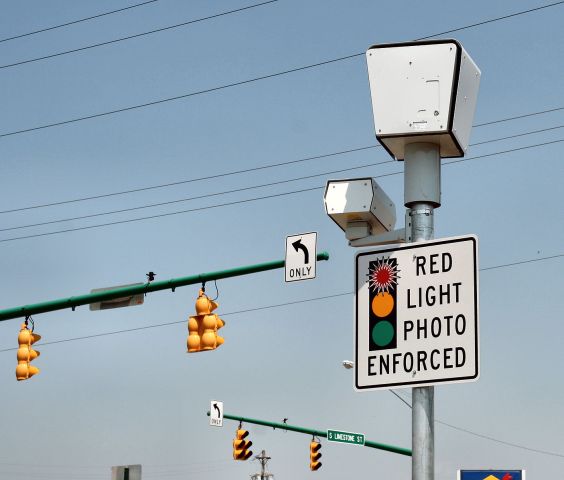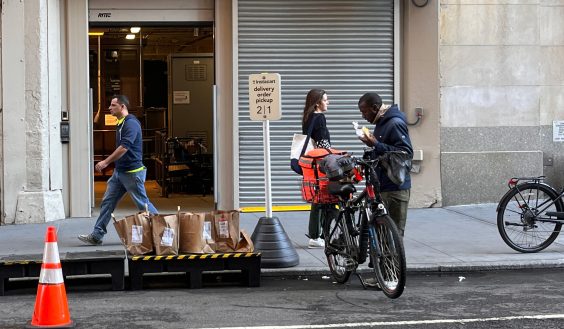When you talk to policy-makers, do you complain about how bicyclists lost out in the last transportation reauthorization and demand that cycling get its “fair share” of funding? Do you tell them that more and more people are riding bikes, and maybe they ought to try it too?

If so, you’ve been doing it all wrong.
Nonprofit strategist Doug Meyer surveyed 30 policy-makers in the House, Senate, and DOT, about evenly divided by people the bicycling movement thinks of as allies and opponents. He identified the winning ways to talk to influential people about support for cycling – and the losing ways. (Check out his results here [PDF].) Meyer unveiled his somewhat surprising results at the National Bike Summit yesterday.
First, people in power are really catching on to the cycling boom. Partly, it’s the beauty of those Pennsylvania Avenue bike lanes and the remarkable success of Capitol Bikeshare – representatives from all over the country see the explosion of active transportation in DC. They’re beginning to change their mental image of a cyclist from a spandex-clad weekend warrior to a business-suited professional with a laptop in her panniers. And they’ve heard Secretary Ray LaHood’s talk about elevating bicycling to be on par with other modes. They know the game has changed.
So, cyclists can stop begging for a seat at the table, Meyer said. “It’s time to sit down.”
Policy-makers think of the rise of two-wheeled transportation more as a shift toward urbanism than just a bicycling phenomenon. And they still don’t care that much if bike facilities are good for bicyclists. They want to hear that they’re good for everybody. Bring local officials, public health workers and other non-cycling interests to meet with policy-makers to plead the case, Meyer advised. “If you’re not speaking traffic safety and economic competitiveness, then forget it,” Meyer told the Bike Summit audience.
Meyer also recommended that cyclists “tone down” their cyclist identity. Convince lawmakers that you’re interested in cycling as part of your concern about larger issues, and present your message as one that’s not just the special interest of a sport enthusiast.
And indeed, cycling advocates aren't just in it for the sport. Meyer also surveyed 281 Summit attendees soon after they arrived and found that nearly 80 percent of them are principally interested in cycling as a form of transportation, with recreation coming in a very distant second at 14 percent. Still, cyclists think they’re not being united in their message. That’s easy enough to fix, said Meyer. “If 80 percent of you feel like transportation is the key thing you want to advance… unite that message.”
And when you talk about cycling as transportation, don’t brag about how it’s the best mode. Don’t try to compete with cars. “It’s like when the [car] door swings open,” Meyer said. “You’re going to lose.” He suggested talking about “complementarity.” Talk about how cycling fits in to an multi-modal transportation mix, that it gives people choices and provides solutions. “Be inwardly bike-centric but outwardly multi-modal,” Meyer advised.
And asking for a “fair share” for cycling is a losing argument, Meyer advised. “When you say ‘fair share,’ you get into all these debates over how much you’re paying in to the transportation fund,” he said. “You’re paying zero? Then your fair share is zero. How do you like that?”
Still, Meyer found that “acceptance is not an issue.” No one he talked to – even those identified as the staunchest opponents – thinks cycling is ridiculous and has no place. The questions are about who funds it, who makes decisions, how it’s incorporated into the rest of the transportation network. When Republicans stand up and insist that bike lanes shouldn’t get federal funding, that’s an argument worth having, but it’s not necessarily a battle to convince them that cycling is worthwhile – just that there’s a reason (as 99 percent of surveyed Summit attendees believe) that it should get federal support.
Cyclists came off as “sore winners” when they complained about losing out in MAP-21, Bike League's Liz Murphy wrote on the Bike League blog. In fact, cyclists came this close to losing enhancements/alternatives funding altogether. The fact that the pot is a little smaller and somewhat reconfigured is still a victory over those who would have eliminated it altogether, especially in such a difficult fiscal environment.
And if advocates have forgotten to heartily thank their allies on Capitol Hill who went to the mat for them – whether or not they ran away with all the spoils – they’ve been remiss. They need to acknowledge the very real budgetary constraints Congress is facing, even as they fight hard for a piece of the pie. Ignoring reality doesn’t help anything.
These are all good things for Summit participants to keep in mind today as they lobby their representatives on Capitol Hill – or at least, those whose offices stayed open despite the rest of the federal government taking a snow day.





